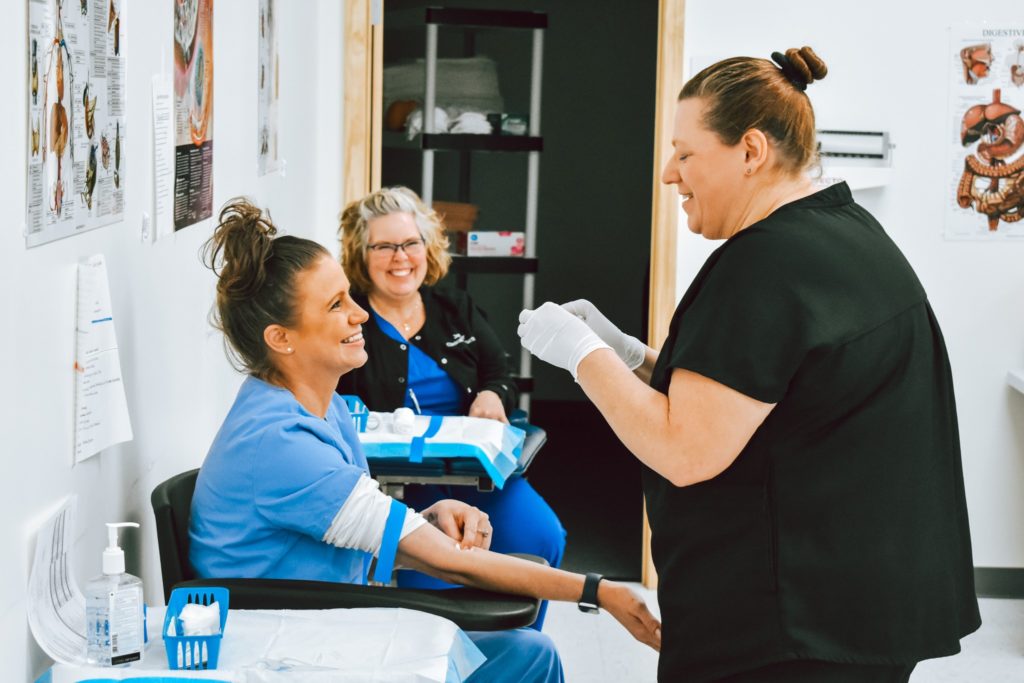
Phlebotomy, derived from the Greek words “phlebo” meaning vein and “tomy” meaning to make an incision, is the medical practice of drawing blood from patients for diagnostic testing, transfusions, or research purposes. A phlebotomist is a skilled healthcare professional who specializes in this procedure. They play a crucial role in the healthcare system by ensuring the accurate and safe collection of blood samples. In this article, we will delve into the key responsibilities of a phlebotomist and provide insights into the salary expectations for this profession.
Phlebotomist Job Description & Responsibilities
As a phlebotomist, one of your primary responsibilities is to collect blood samples from patients. This involves understanding and following strict protocols to ensure the safety and comfort of the patient. You must have a deep knowledge of human anatomy and be proficient in locating and accessing veins. Proper identification of patients, labeling of samples, and maintaining accurate records are also essential aspects of the job.
Additionally, a phlebotomist must possess excellent communication skills to interact with patients and alleviate any fears or concerns they may have. The ability to work well under pressure and handle difficult situations with empathy and professionalism is crucial. Furthermore, phlebotomists should be knowledgeable about infection control practices and adhere to strict safety guidelines to prevent the transmission of diseases.
Importance of Proper Phlebotomy Techniques and Safety Protocols
The significance of adhering to proper phlebotomy techniques and safety protocols cannot be overstated. A single mistake during the blood collection process can lead to inaccurate test results, patient discomfort, or even serious complications. Phlebotomists must be well-versed in the correct procedures for venipuncture and skin puncture methods, as well as the appropriate use of equipment such as needles, tubes, and syringes.
Moreover, understanding and implementing infection control measures is paramount in preventing the spread of infectious diseases. This includes practicing proper hand hygiene, wearing personal protective equipment, and maintaining a sterile environment. By following these protocols, phlebotomists contribute to the overall safety of patients, healthcare professionals, and themselves.
Skills and Qualifications Required to Become a Phlebotomist
To excel in the field of phlebotomy, certain skills and qualifications are necessary. Firstly, a high level of attention to detail is essential to ensure accurate sample collection and labeling. Phlebotomists must possess good hand-eye coordination and dexterity to perform venipuncture with precision. Strong communication skills are also vital, as you will be interacting with patients of various ages and backgrounds.
Furthermore, a comprehensive understanding of medical terminology, anatomy, and physiology is crucial for a phlebotomist. This knowledge allows them to correctly identify different types of blood samples and understand the purpose behind each test. Additionally, being empathetic, patient, and able to handle stressful situations with calmness and professionalism are highly valued traits in this profession.
In terms of qualifications, most employers require phlebotomists to have completed a phlebotomy training program. These programs typically include classroom instruction as well as hands-on clinical experience. After completing the training, individuals can pursue certification through organizations such as the National Phlebotomy Association or the American Society for Clinical Pathology. Certification not only enhances job prospects but also demonstrates proficiency and commitment to the field.
Training and Certification Options for Aspiring Phlebotomists
If you aspire to become a phlebotomist, there are several training and certification options available to you. vocational schools like Northeast Technical Institute offer phlebotomy programs that can be completed in a relatively short period of time (about 2 months). Our program provides a comprehensive education on phlebotomy techniques, medical terminology, and safety protocols.
Upon completion of the training program, individuals can choose to pursue certification. The most recognized certifications for phlebotomists are offered by the American Medical Technologists (AMT). These certifications require passing a comprehensive exam that assesses the candidate’s knowledge and skills in phlebotomy.
The certification not only validates your expertise but also opens up more job opportunities and increases your earning potential. It demonstrates to employers that you have met the industry’s standards and are committed to providing quality patient care.
Salary Expectations for Phlebotomists
The salary of a phlebotomist can vary depending on several factors, such as experience, location, and the type of healthcare facility. According to the U.S. Bureau of Labor Statistics, the median annual wage for phlebotomists as of May 2021 was $36,670. However, entry-level phlebotomists may earn less, while those with several years of experience or working in specialized settings may earn significantly more.
Phlebotomists employed in hospitals or diagnostic laboratories tend to earn higher salaries compared to those working in physician’s offices or outpatient care centers. Geographic location also plays a role in salary differences, as areas with a higher cost of living often offer higher wages.
Overall, while phlebotomy may not be the most lucrative profession in the healthcare field, it provides a stable income and offers opportunities for career advancement and specialization.
Job Prospects and Career Growth Opportunities in Phlebotomy
The demand for phlebotomists remains steady, as blood collection is an integral part of the healthcare system. Opportunities for employment can be found in various healthcare settings, including hospitals, clinics, blood banks, research laboratories, and public health agencies.
Moreover, as a phlebotomist gains experience and additional certifications, they can explore career advancement opportunities. Some may choose to specialize in fields such as pediatric phlebotomy or geriatric phlebotomy, while others may pursue roles in laboratory management or education. With further education and training, phlebotomists can even transition to become medical laboratory technicians or technologists.
Continuing education is essential for phlebotomists to stay updated with the latest advancements in the field. Attending conferences, workshops, and pursuing additional certifications not only enhances knowledge but also improves career prospects.
Differences between a Phlebotomist and a Phlebotomy Technician
While the terms “phlebotomist” and “phlebotomy technician” are often used interchangeably, there are slight differences between the two roles. A phlebotomist is generally considered to have completed a formal training program and obtained certification. They possess a deeper knowledge of phlebotomy techniques, medical terminology, and safety protocols.
On the other hand, a phlebotomy technician may not have completed a formal training program or obtained certification. They may receive on-the-job training or basic instruction in phlebotomy. Phlebotomy technicians typically perform limited tasks related to blood collection and may work under the supervision of a phlebotomist or other healthcare professionals.
Exploring Job Opportunities for Phlebotomists in Different Healthcare Settings
Phlebotomists can find employment opportunities in various healthcare settings, each offering unique advantages and challenges. Hospitals provide a fast-paced environment where phlebotomists encounter a diverse range of patients and medical conditions. This setting allows for exposure to different departments and specialties, providing valuable learning opportunities.
Clinics and physician’s offices offer a more personalized and intimate setting, where phlebotomists often develop long-term relationships with patients. Outpatient care centers focus on specialized areas such as dialysis or imaging, requiring phlebotomists to adapt to specific patient needs and procedures. Blood banks and research laboratories provide opportunities for phlebotomists to contribute to life-saving procedures and advancements in medical science.
The choice of healthcare setting depends on individual preferences, career goals, and the type of patient interaction one desires. Each setting offers unique experiences and challenges, allowing phlebotomists to continually grow and develop their skills.
Conclusion: The Rewarding and Vital Role of Phlebotomists in Healthcare
In conclusion, phlebotomists play a crucial role in the healthcare system by ensuring the accurate and safe collection of blood samples. They possess a unique set of skills and knowledge that allows for the successful execution of venipuncture and the proper handling of blood specimens. The phlebotomist job description includes responsibilities such as patient interaction, sample labeling, and adherence to safety protocols.
Phlebotomy is a rewarding profession that offers opportunities for career advancement and specialization. While the salary expectations may vary, phlebotomists can enjoy stable employment and contribute to the overall well-being of patients. By becoming a certified phlebotomist, you can enter a fulfilling career that combines compassion, precision, and the pursuit of medical knowledge.
Become a Certified Phlebotomist
If you are interested in pursuing a career as a phlebotomist, take the first step towards your goal by enrolling in our comprehensive phlebotomy training program and obtaining your certification. Become a certified phlebotomist today and embark on a fulfilling journey in the healthcare field in less then 2 months!








